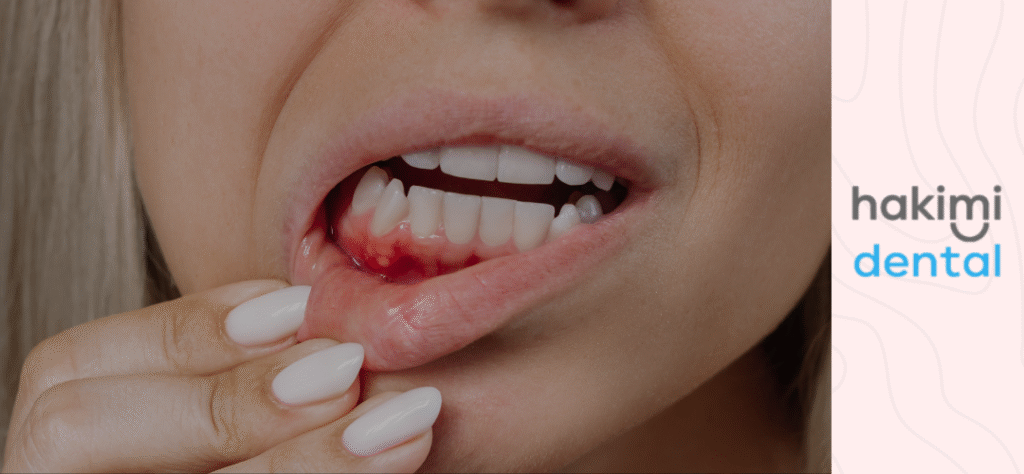Causes, treatment & prevention of gum bleeding
If you’ve ever wondered “why do my gums bleed when I brush my teeth?”, you’re not alone. Many people notice bleeding when brushing or flossing and assume it’s normal — but it’s actually a sign your gums need a little extra care.
At Hakimi Dental Clinic in Oldbury, we see this issue daily, and in most cases, it’s simple to treat once the cause is identified. Healthy gums should not bleed, so spotting a few red streaks on your toothbrush or after flossing is worth paying attention to.
This article explains what causes bleeding gums, when it’s a sign of gum disease, and what you can do at home and with your dentist to stop it for good.

Why gums bleed when brushing
There are several reasons why gums bleed when brushing teeth, ranging from mild irritation to early gum disease. Let’s look at the most common causes and what you can do about them.
1. Plaque build-up and gingivitis
The number one cause of bleeding gums is plaque build-up — a soft, sticky film of bacteria that forms on your teeth each day. If it’s not removed thoroughly, it can irritate your gums and lead to gingivitis (the earliest stage of gum disease).
Common signs of gingivitis include:
Bleeding when brushing or flossing
Red or swollen gums
Bad breath or a bad taste in the mouth
If this sounds familiar, you’re not alone. The good news is that gingivitis is reversible with professional cleaning and improved brushing habits. You can learn more about it in our dedicated guide: Gingivitis Treatment – Expert Dental Advice.
2. Brushing too hard
Brushing harder doesn’t mean brushing better. Using a stiff-bristled toothbrush or applying too much pressure can damage your gum tissue and cause bleeding.
Try switching to a soft-bristled toothbrush and using gentle circular motions. Electric toothbrushes with pressure sensors can also help prevent over-brushing.
If you’re unsure whether your technique is causing the issue, ask your dental hygienist in Oldbury to demonstrate the ideal brushing method.
3. Infrequent flossing
If you’ve only just started flossing, don’t panic if your gums bleed a little — it’s a common reaction when the tissues are inflamed or not used to contact.
Within a few days of consistent flossing, bleeding should stop as your gums become healthier.
If it persists for more than a week, it’s worth mentioning during your next dental check-up in Oldbury.
4. Hormonal changes
Pregnancy, puberty, or menopause can all make your gums more sensitive to plaque and bacteria. This hormonal effect — often called pregnancy gingivitis when it occurs in expectant mothers — can cause tenderness and bleeding.
During these times, keeping up with regular hygienist visits and daily cleaning is especially important.
5. Medical conditions or medications
Certain health conditions (like diabetes or vitamin deficiencies) and medications (such as blood thinners) can increase your risk of gum bleeding.
Always tell your dentist about your medical history and medication list so they can tailor your care plan safely.
Why do my gums bleed when I floss?
If you’ve ever thought “why do my gums bleed when I floss?”, the short answer is that your gums are inflamed — usually due to plaque and bacteria build-up between the teeth.
Flossing helps remove the debris your toothbrush can’t reach, but if your gums are already sensitive, they may bleed until inflammation reduces.
Keep flossing daily — gently — and within a week or two, the bleeding should stop.
If it doesn’t, book an appointment with your dental hygienist in Oldbury for a professional clean and tailored advice.
When bleeding gums mean gum disease
Persistent bleeding, swelling, or bad breath could indicate gum disease.
There are two main stages:
- Gingivitis: Early inflammation; gums bleed but teeth remain firm.
- Periodontitis: Advanced infection that can cause bone loss and tooth movement if untreated.
If you’ve been noticing why do my gums bleed when I brush my teeth more often or your gums look puffy, it’s essential to get checked.
Our dentists can assess whether it’s simple gingivitis or a deeper issue and plan your treatment.
Learn more about this in our expert article: Gingivitis Treatment – Expert Dental Advice.
How your dentist can help stop bleeding gums
Professional cleaning and personalised care make a big difference. At Hakimi Dental Clinic, we usually follow these steps:
| Treatment option | How it helps | Typical outcome |
|---|---|---|
| Scale & polish (hygienist) | Removes plaque and tartar above the gumline using ultrasonic and polishing tools. Book via our dental hygienist in Oldbury . | Gums settle quickly; bleeding reduces within days; fresher feel. |
| Deep cleaning (root planing) | Cleans bacterial deposits beneath the gums and smooths root surfaces to aid healing. | Inflammation drops; pockets improve; long-term bleeding control. |
| Tailored home-care coaching | Personalised guidance on brushing, interdental brushes/floss, and product choices at your dental check-up . | Cleaner gumline daily; prevents plaque build-up and recurrence. |
| Antibacterial mouthrinses | Short course to reduce bacterial load while gums heal. | Fresher breath; less tenderness; supports healing after cleaning. |
| Review & maintenance visits | Regular monitoring to track healing and adjust your plan. Learn more in our gingivitis advice blog . | Stable, healthy gums; early intervention if issues return. |
| Same-day urgent care | If you have pain/swelling with bleeding, contact our emergency dentist . | Rapid relief and protection against spreading infection. |
If pain or swelling accompanies your bleeding gums, contact our emergency dentist in Oldbury for same-day advice.
Why patients trust Hakimi Dental Clinic
- Our dental team sees and treats gum bleeding cases daily — from mild irritation to advanced gum disease — and helps patients restore confidence in their oral health.
- We use advanced ultrasonic scalers and digital assessment tools to target plaque precisely and make hygiene treatments comfortable.
- As trusted local clinicians, we base all gum care on evidence-based guidelines and proven results. You can read more expert advice in our gingivitis blog.
- We explain each step of treatment clearly and only recommend what’s necessary for your health.
You can learn more about our general care and hygiene services here:
Home care tips to prevent bleeding gums
Once your gums are healthy again, keeping them that way is simple:
- Brush twice a day with fluoride toothpaste and a soft brush.
- Floss or use interdental brushes daily.
- Use mouthwash designed for gum care.
- Eat a balanced diet with plenty of vitamin C and calcium.
- Avoid smoking, which makes gum disease more likely and harder to treat.
- Visit your hygienist regularly to maintain results.
Your dental hygienist in Oldbury will help you choose the right products and technique for your teeth and gums.
When to see a dentist
If your gums bleed for more than a few days despite gentle brushing and flossing, don’t ignore it. Persistent bleeding, pain, or swelling can indicate a deeper problem that needs professional attention.
Book a dental check-up as soon as possible, or contact our emergency dentist if you experience severe discomfort.
Final thoughts
If you’ve been asking yourself “why do my gums bleed when I brush my teeth?” or “why do my gums bleed when I floss?”, it’s time to take action.
Healthy gums shouldn’t bleed. With the right care at home and support from your Oldbury dentist, you can reverse the problem and protect your smile for years to come.
Visit Hakimi Dental Clinic to book your appointment today — and let’s get your gums back to full health.
FAQs about why your gums are bleeding when brushing
It’s usually caused by plaque build-up or early gum disease. Brushing removes bacteria, but if plaque remains near the gumline, inflammation and bleeding occur.
No — keep brushing gently and consistently. Avoid harsh scrubbing, and book a hygienist visit to remove any tartar.
If you’ve recently started flossing, bleeding is a sign your gums are inflamed. With regular care, this should stop within a week.
Use a soft toothbrush, floss daily, and rinse with an antibacterial mouthwash. A hygienist cleaning is the fastest way to remove the cause.
Yes, if gum disease is left untreated. Early gingivitis can progress to periodontitis, which affects bone support around the teeth.
